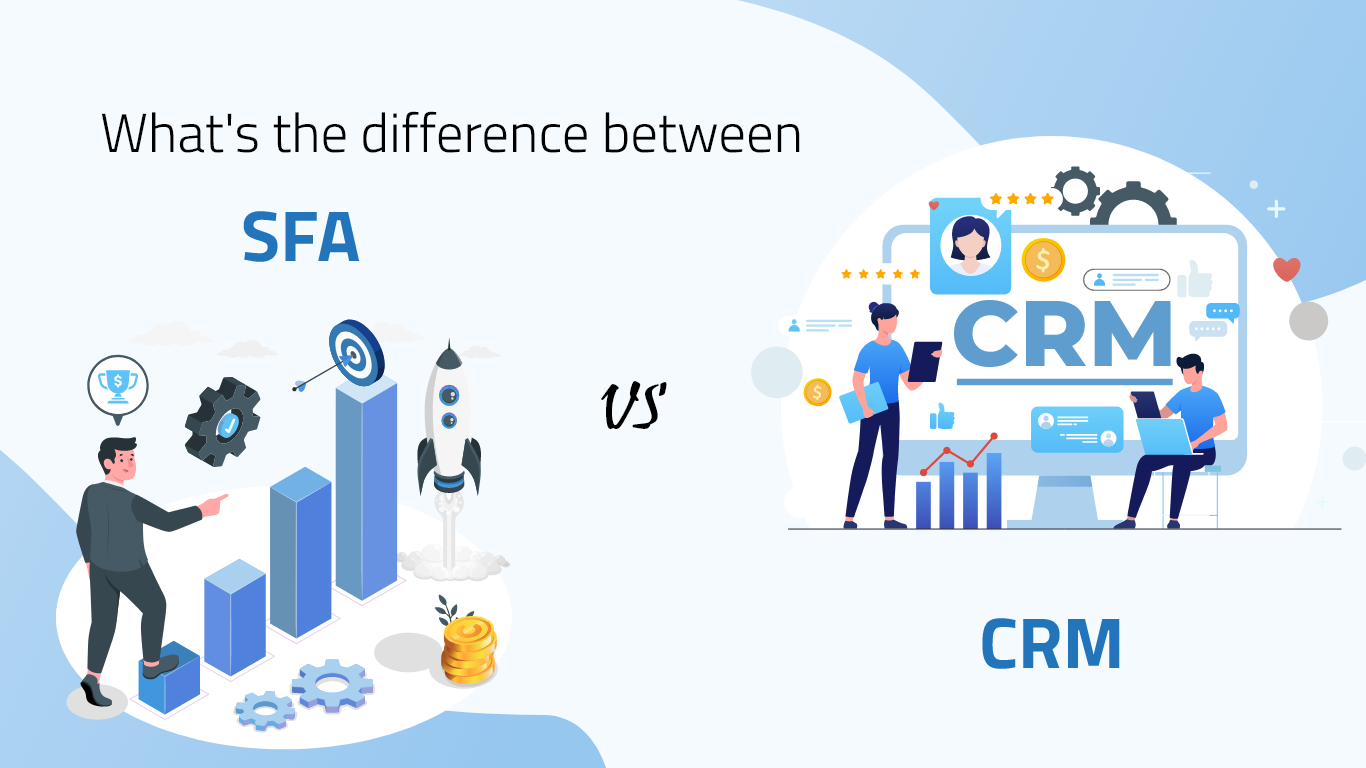
What’s the difference between SFA and CRM?
Businesses are continuously seeking innovative methods to enhance their sales procedures, and many have achieved notable success through the adoption of sales force automation. In this comprehensive guide, we’ll delve into the fundamentals of sales force automation and explore the distinctions between CRM and SFA solutions.
Introduction
Salesforce Automation (SFA) and Customer Relationship Management (CRM) stand as two prominent software categories within the CRM industry. Although both aim to streamline and automate sales and customer service processes, they diverge in their approach and functionality.
SFA software caters primarily to sales teams, offering features such as contact and lead management, opportunity tracking, quote and order management, and pipeline reports. On the contrary, CRM software targets a broader spectrum of users, encompassing sales, marketing, customer service, and IT departments. CRM solutions boast features like contact management, account management, lead management, opportunity tracking, case management, product catalogs, quotes and orders, workflow automation, analytics, and reporting.
Determining which solution suits your business hinges on your specific needs and requirements. If your focus lies primarily on sales processes and you seek a system that is user-friendly and swiftly deployable, SFA may be the ideal choice. Conversely, if you yearn for a more comprehensive solution that addresses all facets of customer relationships, CRM emerges as the preferred option.
What is SFA (Sales Force Automation)?
Sales Force Automation (SFA) encompasses the utilization of software and streamlined workflows to enhance the efficiency of sales management tasks. Its primary objective is to optimize the sales process by minimizing the manual, repetitive activities typically performed by sales representatives.
Centralizing the entire history and data about client interactions facilitates contact, opportunity, and task management. Additionally, SFA aids in reminders, notifications, and lead tracking, thereby enhancing sales productivity.
SFA technology automates tasks for both individual sales professionals and entire sales teams, aiming to boost efficiency and productivity throughout the sales cycle. It achieves this by automating mundane tasks like data entry and lead tracking, while also providing real-time insights into sales performance.
While SFA and Customer Relationship Management (CRM) are often used interchangeably, they serve distinct purposes. CRM encompasses a broader spectrum of customer management activities, including marketing, customer service, and order fulfillment, whereas SFA specifically focuses on optimizing the sales process within the CRM framework.
What is CRM (Customer Relationship Management)?
Customer Relationship Management (CRM) software is a vital tool for businesses seeking to enhance their customer relationships. It enables businesses to track customer interactions, store valuable customer data, and automate various marketing and sales tasks.
Moreover, CRM platforms serve as centralized repositories for customer data, including contact details, purchase history, and preferences. This information empowers businesses to create personalized marketing campaigns and offers tailored to individual customers.
Additionally, CRM systems streamline marketing and sales processes by automating tasks such as lead generation, prospecting, and email marketing.
Overall, CRM systems are indispensable for businesses aiming to strengthen customer relationships. By effectively managing customer interactions and leveraging customer data, CRM platforms enable businesses to deliver superior service and enhance customer experiences.
What’s the Difference Between Sales Force Automation and CRM?
We’ve already discussed CRM software, and you might be asking if your company has to pick between CRM and sales force automation. There is no need to pick between sales force automation and CRM. These two tactics can be used in conjunction to increase sales and profitability.
Using SFA tool software, CRM data may be utilized to track sales changes and opportunities across a broad range of goods and customer profiles. Consequently, sales force automation may assist marketing and customer care teams in identifying and resolving difficulties.
Even so, there are significant distinctions between CRM and sales force automation.
- Although time management tools for sales teams are helpful, a CRM’s main goal is data collection based on prior customer contacts. SFA systems automate the process, but a CRM system helps you plan how to approach prospects.
- The remote access function of a CRM is its key benefit. Although certain solutions can’t automatically update data, sales force automation systems do support mobile devices. Due to the integration of SFA technology with CRM, sales teams now have access to real-time data well after the marketing or customer care teams have amended it.
- Marketing automation capabilities are already present in a CRM system. Teams may optimize client prospects when used in conjunction with an SFA platform; marketing teams can work together on outbound messages such as drip emails, alerts, etc.
Business leaders need to understand that you don’t need to choose between the two business intelligence tools. These two tools complement each other so well that integrating them is the best way to boost profitability.
A CRM for sales force automation helps in a couple of ways:
- Aligns sales and marketing teams which makes it easier to build relevant customer profiles and identify new business opportunities.
- Serves as an integrated platform across sales, marketing, and services to ensure that no data is lost or manually transferred.
- Provides a holistic view of the account, even after they convert, which results in a higher customer lifetime value.
Again, the purpose of comparing the benefits of CRM and SFA is not to persuade you to pick one over another. We advise choosing a CRM automation system since it will enable you to lay the groundwork for a more effective sales approach.
Conclusion
In conclusion, SFA and CRM are separate tools with unique functions. SFA focuses on sales force automation, aiding businesses in managing customer relationships and tracking deals through the sales cycle. On the other hand, CRM, or Customer Relationship Management, assists companies in effectively managing client relations and fostering long-term customer connections. Both systems offer immense value when utilized appropriately, underscoring the importance of comprehending their distinctions to optimize business operations.

